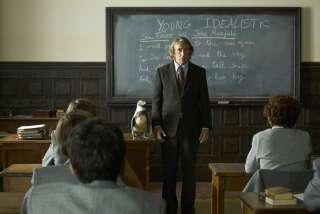Getting a bird’s-eye view on society
- Share via
The London Pigeon Wars
A Novel
Patrick Neate
Farrar, Straus & Giroux: 324 pp., $24
*
It isn’t often that pigeons play a prominent role in a novel, or any role for that matter. Yet Whitbread Award-winning author Patrick Neate gives these hapless birds, scourge of so many urban landscapes, a presence and even a voice in his ambitious third novel, “The London Pigeon Wars.”
Neate’s ostensible focus is a group of disaffected Londoners he calls “twirtysomethings,” defined as being “of, say, twenty-seven to thirty-four, the age range in which degrees of wealth, power, and happiness significantly diverged for the first time.” But an entirely different story is being spun from above by a pigeon called Ravenscourt -- part philosopher, part social commentator -- who describes a turf warfare that has broken out among birds and offers a perspective on the puzzling human society below. “When we look down we see organized confusion,” he says.
Aptly, Ravenscourt delivers soliloquies in a form of language that can be described only as pidgin-speak -- make that pigeon-speak. People are called “peepniks.” Men are “savories”; women are “sweets.” Male and female birds are “geezes” and “coochies.” Lamenting the leadership of Gunnersbury -- Ravenscourt’s coochie comrade in the pigeon wars -- he says: “I’d best be blunt as a woodpecker’s beak after a month in the Concrete. For all her indubitable qualities of leadership and loquacity, and her indisputable skill for scoping the nuts and niblets that stayed stuck in the gizzard of a geez, Gunnersbury was no general, and that’s the verity.” Such odd syntax and diction are a bit hard to follow and slightly annoying at first, but by the end, Ravenswood and his fellow pigeons prove to be the novel’s most compelling characters.
Back to the peepniks: There’s Freyda, a fledgling entrepreneur and hat designer; Tom, a teacher, and his ex-girlfriend, Karen, for whom he still pines; Tariq, a debt-laden dot-commer, and his wife, Emma; Ami, a TV newscaster; and Kwesi, a rapper/performance poet. Their languid lives are suddenly rejuvenated when an old university friend, Murray, shows up after having vanished for a decade.
Murray has always been defined by a few simple things: his single moniker (no surname); his bizarre diet of nothing but chicken; and his easygoing, confident, enviable charm. No one quite knows what Murray does for a living, serving to heighten his mythic status. His reappearance provides his friends with a much-needed jolt. But the prankster fun, initially harmless, soon deteriorates into something far more troubling. And it is Murray’s presence that mysteriously stirs turmoil among the pigeons, who begin attacking people, as Ravenscourt dutifully observes. It seems that violence and chaos among London’s human citizens beget the same in pigeon society.
The premise of “The London Pigeon Wars” is wildly far-fetched, but therein lies its virtue. (You may never look at a pigeon the same way again.) Neate is less convincing when writing about the group of friends. Their unsatisfying romantic relationships and stalled careers seem stale, their lives ultimately shallow. Why they are drawn to Murray is unclear, and what makes him tick is fuzzier still. His motives for stirring up trouble unfold slowly but without enough detail or clarity to care about. By that point you may simply wish he’d disappear again.
Neate deftly brings together his fable’s two narrative strands, but it’s those rats with wings who are the most affecting. Ravenscourt is easily the most dignified and poignant pigeon in literature. His sensitive, wise perceptions on group identity, the nature of warfare and London give the novel its best passages, and Neate’s linguistic acrobatics in the bird sections are dazzling. (Oddly, when writing about people, his prose can fall flat.)
As urban satire, “The London Pigeon Wars” isn’t as biting as it might have been, and its insights are hardly profound. Even so, this novel has enough cleverness and sly observations to make it well worth dipping your beak.
More to Read
Sign up for our Book Club newsletter
Get the latest news, events and more from the Los Angeles Times Book Club, and help us get L.A. reading and talking.
You may occasionally receive promotional content from the Los Angeles Times.










